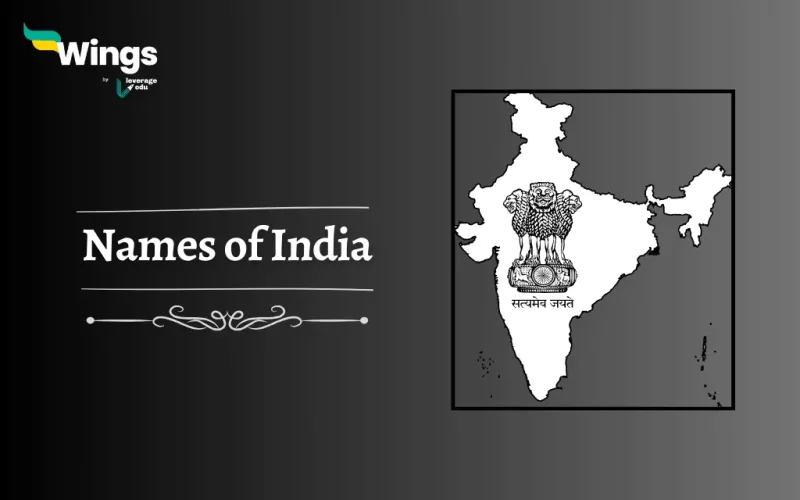India as known by the world today was not always popular by this name. The name India was popularised during the period of modern history. There are many names of India that the country acquired and relished through the ages. Additionally, it was dependent on how foreigners identified this land and at times by the ruling party. This country has a massive history of names like India, Bharata, Hindustan, Aryavarta, Jambudvipa, Tenjiku and many more. Let’s learn the details of each of these names of the country.
Also Read: Find Out Who Destroyed the Nalanda University
What were the Names of India?
Here is a list of all names of India that have been noted down in history. Some of these names are side names or referral names used as titles to the land.
| Names | Origin of the Name |
| India | Modern name derived from the river Indus |
| Bharata | The Vedic community of Bharatas |
| Hindustan | Derived by river land of Indus river |
| Bharatvarsha | After the great ruler Bharata |
| Himavat Pradesh | Home to Himalayas |
| Pavitra Bhumi | The Land of Pure |
| Moksha Bhumi | The Land of Enlightenment |
| Karma Bhumi | Land of good deeds |
| Yog Bhumi | Land of spiritual connection with the almighty |
| Punya Bhumi | Land of blessings |
| Nabhivarsa | Named after a ruler |
| Jambudvipa | During the Vedic era based on a sacred jambul or jamun fruit |
| Dravida | Southern India referred by Indo-Iranians |
| Aryavarta | Northern India referred by Indo-Iranians |
Also Read: Navratnas of Akbar: Birbal, Tansen and More
What was the Origin of the Major Names of India?
Here we will be discussing some of the most popular names of India that have been popular throughout history. Names such as India, Bharata, Hindustan, Jambudvipa, Tenjiku and Aryavarta are discussed hereunder.
Bharata
The name Bharata originated in the Vedic times. It is derived from the name of King Bharat the son of King Dushyant and Shakuntala. He was a Chakravarti Samrat with the lineage of Pandavas. The Vishnu Purana of Vedic India has a geographical depiction of Bharata. While writing our constitution, the name Bharata was also included in the official documents. India has been identified as “India, that is Bharata, shall be a Union of States”.
Jambudvipa
Jambudvipa is an ancient Sanskrit term used in Hindu cosmology to refer to the entire landmass of the Indian subcontinent. It translates to “Rose-Apple Land” or “Land of the Rose-Apple Tree” and is described as one of the nine divisions of the world according to Hindu cosmology. Additionally, Jambudvipa is mentioned in various Hindu scriptures and texts, such as the Puranas and the Mahabharata, where it represents the region that encompasses much of present-day India, along with some neighbouring countries.
Aryavarta
Aryavarta is also a name from the Vedic period. The name was given to the northern part of India to differentiate it from the ‘Dravida’ or South India. This happened after the Indo-Persian people moved to the Indian subcontinent to settle for food and other resources. These names are recorded in the Manu Smriti and the Hindu Puranas. The area of Aryavarta is defined from the Himalayas to Madhya Pradesh in one stretch and from the Bay of Bengal in the east to the Arabian Sea in the west. The name translates to the land of the noble.
Also Read: Types of Vedas: Important Features & Details
Hindustan
The name Hindustan is the gift of a Great Persian Ruler Darius. During his entourage to India, he named it the land of Hindus, or Hindustan. The term Hindus is also a derivation from the river Indus or Sindhu. It was pronounced as Hindu by the Persians. So, the river became Hindu, people who lived there were called Hindus and their land came to be known as Hindustan. This name for India is used in many freedom struggles, patriotic songs and writings. This name however is not listed in the Indian constitution.
Tenjiku
“Tenjiku” is a term that has been historically used in East Asian countries, particularly in Japan, to refer to India. It translates to “Heavenly Abode” or “Celestial Land.” The term likely originated from ancient Buddhist texts and travelogues, where India was often depicted as a land of spiritual enlightenment and wisdom. Moreover, it reflects the reverence and admiration that many cultures have held for India throughout history, particularly due to its profound influence on the development of Buddhism and other spiritual traditions.
India
At the time of Alexander the Mauryan dynasty was ruling in India. The name Hindustan or Hindus was popularly used in the northern parts of India at that time. The Greeks took the prefix from Hindus or Hindustan and derived the name India. Greeks often take the H silent so they made the word IND, to build various names including Indus, Indos and Indika. At last, we landed at a popular name called India. The name became popular worldwide as the Greek travellers travelled across the world for trade etc. It is the most widely used and internationally documented name of the country now.
Relevant Blogs
| Tribes of India | Humayun |
| Stone Age Tools | Neolithic Age |
| Mesolithic Age | Ashoka |
| Slave Dynasty | Tughlaq Dynasty |
| Gurjara-Pratihara Dynasty | Magadha Empire |
This was all about the Names of India. If you want to read more articles like this, you can get Study notes on the Modern History of India here. Also, you can visit our general knowledge page on Indian History!
 One app for all your study abroad needs
One app for all your study abroad needs













